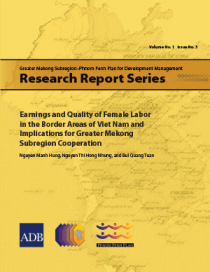Earnings and Quality of Female Labor in the Border Areas of Viet Nam and Implications for Greater Mekong Subregion Cooperation

Border-gate economic zones (BEZs) are symbols of the increased cross-border exchange and the development initiative of the border areas in the Greater Mekong Subregion (GMS). Over the past decade, BEZs have been able to attract a great number of women workers seeking new job opportunities.
Using survey data collected at the BEZs of Mong Cai, Cau Treo, and Moc Bai in Viet Nam and from the Viet Nam Household Living Standard Survey (VHLSS) to examine the factors that influence earnings in the BEZs and in the border provinces that host the BEZs and those where no BEZs are present, the research finds that the BEZs and cross-border integration increase the earnings of female labor. However, there seems to be a missing link between the establishment of the BEZs and cross-border integration and the improvement of female labor quality. Poor labor quality, and the predominance of the exploitative factors exaggerated by the unsustainable structure of the border-gate economy, are likely to make BEZs vulnerable areas of the GMS labor market where women's rights are easily violated and female workers have little awareness and self-estimation of their working status.
This research report was made under the Greater Mekong Subregion-Phnom Penh Plan for Development Management.
Download
| Attachment | Size |
|---|---|
| 634.91 KB |
Last Updated: Wednesday, 11 April 2018
